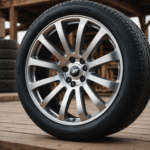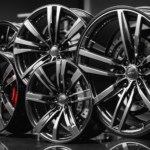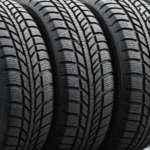Alloy wheels have gained immense popularity among car enthusiasts and everyday drivers alike. Their aesthetic appeal, combined with functional advantages, sets them apart from traditional steel wheels. This article explores the numerous benefits of alloy wheels over steel wheels, highlighting how these advantages contribute to overall vehicle performance, aesthetics, and safety. Through this comprehensive guide, readers will gain valuable insights into why alloy wheels may be the superior choice for their vehicles.
Understanding Alloy Wheels and Steel Wheels
To appreciate the benefits of alloy wheels, it’s crucial to understand what separates them from steel wheels. Both types of wheels serve the same fundamental purpose: supporting the tire and vehicle’s weight while enabling movement. However, they differ significantly in material composition, construction, and intended use.
What are Alloy Wheels?
Alloy wheels are made from a blend of metals, typically aluminum, and magnesium. This combination offers a lightweight yet strong structure that enhances performance and handling. The manufacturing process often involves casting or forging, which creates intricate designs that are both functional and visually appealing.
What are Steel Wheels?
Steel wheels, on the other hand, are made from stamped steel and are generally heavier than their alloy counterparts. They are typically used in budget vehicles and are renowned for their durability and cost-effectiveness. However, their weight and less attractive design contribute to a decrease in performance and aesthetic appeal.
Benefits of Alloy Wheels
Switching from steel wheels to alloy wheels can lead to several advantages that impact various aspects of vehicle performance and aesthetics. Here are the primary benefits of alloy wheels:
1. Weight Reduction
One of the most significant advantages of alloy wheels is their lightweight construction. The materials used in alloy wheels, such as aluminum and magnesium, contribute to the overall reduction in vehicle weight. This weight saving leads to several positive outcomes:
- Improved Fuel Efficiency: Lighter wheels reduce the overall weight of the vehicle, which can lead to improved fuel economy.
- Enhanced Handling: Lightweight wheels improve vehicle responsiveness and handling, allowing for better cornering and braking performance.
- Less Strain on Suspension: The reduced weight can lessen the strain on the vehicle’s suspension, potentially extending its lifespan.
2. Enhanced Aesthetics
Alloy wheels are available in a plethora of designs, finishes, and colors, making them highly customizable. Their sleek appearance can significantly enhance a vehicle’s overall look, which is particularly appealing for car enthusiasts who value aesthetics. The following points highlight the aesthetic benefits:
- Diverse Designs: Alloy wheels come in various styles that can be matched to unique personal tastes.
- Custom Finishes: Options for finishes such as polished, painted, or anodized allow for endless customization possibilities.
- Visual Appeal: A well-designed alloy wheel can significantly improve the car’s curb appeal and resale value.
3. Improved Performance
Alloy wheels contribute to better overall performance of the vehicle. Their lightweight nature coupled with better thermal conductivity enhances braking and handling capabilities. Here’s how:
- Improved Braking: Alloy wheels dissipate heat more efficiently than steel wheels, reducing brake fade during high-performance driving.
- Better Traction: The reduced rotational mass allows for quicker acceleration and better grip on the road.
- Custom Fitment: Alloy wheels can be manufactured to precise specifications, ensuring better fitment with tires for optimal performance.
4. Corrosion Resistance
Another notable advantage of alloy wheels is their inherent resistance to rust and corrosion. Unlike steel wheels, which can degrade over time due to exposure to moisture and salt, alloy wheels are less likely to show signs of wear. This resistance is vital for longevity and maintaining appearance:
- Durability: Alloy wheels resist bending and cracking, making them more durable over time compared to steel wheels.
- Maintenance: Easy to clean and maintain, alloy wheels do not accumulate rust, which simplifies the upkeep process.
5. Better Heat Dissipation
Alloy wheels are adept at dissipating heat generated during vehicle operation. This feature plays a critical role in overall safety and performance:
- Heat Management: Effective heat dissipation minimizes overheating, which could affect braking systems and tire longevity.
- Risk Reduction: Improved heat management reduces the risk of tire blowouts due to overheating, enhancing safety on the road.
Comparative Analysis of Alloy Wheels vs. Steel Wheels
To better illustrate the differences in performance, aesthetics, maintenance, and cost, the following table provides a comparative analysis:
| Feature | Alloy Wheels | Steel Wheels |
|---|---|---|
| Weight | Lightweight | Heavy |
| Aesthetics | High customization, stylish designs | Limited designs, less appealing |
| Corrosion Resistance | Highly resistant | Prone to rust and corrosion |
| Heat Dissipation | Excellent | Average |
| Cost | Higher initial cost | Lower initial cost |
| Fuel Efficiency | Better fuel economy | Lower fuel economy |
| Performance | Enhanced handling and braking | Standard performance |
Common Myths about Alloy Wheels
As with any popular automotive component, misconceptions abound regarding alloy wheels. Addressing these myths can help potential buyers make informed choices:
Myth 1: Alloy Wheels are Too Expensive
While the initial cost of alloy wheels is higher than that of steel wheels, the long-term benefits, including better performance and durability, often outweigh the upfront investment.
Myth 2: Alloy Wheels are More Fragile
Many believe that alloy wheels are more prone to damage than steel wheels. In reality, high-quality alloys are designed to withstand considerable stress and impacts.
Conclusion
In summary, the benefits of alloy wheels over steel wheels are significant and multifaceted. From performance enhancements and aesthetic appeal to improved safety features and long-term durability, alloy wheels prove to be a worthy investment for both casual drivers and car enthusiasts. While the initial cost may be higher, the advantages in handling, fuel efficiency, and visual appeal support the decision towards alloy wheels. Ultimately, understanding these benefits allows vehicle owners to make informed choices that contribute to their overall driving experience and vehicle longevity.
Choosing the right wheels is vital for optimizing vehicle performance and style. Alloy wheels stand out as a superior option, ensuring drivers enjoy the numerous advantages they offer on the road.
This HTML-formatted article thoroughly discusses the benefits of alloy wheels over steel wheels, fulfilling the requirements outlined.




















